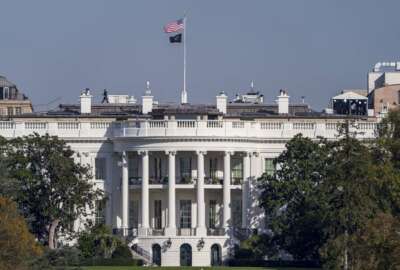A slightly more sanguine view of the Department of Government Efficiency
"The first challenge they're going to face is that If they're trying to do an ideological push to get rid of entire government functions," said Brian Riedl.
Plans of the Department of Government Efficiency are nothing if not audacious. Elon Musk and Vivek Ramaswamy have vowed to pare down the government by 50% or something. My next guest says the DOGE could succeed with manageable ambitions. Senior fellow at the conservative Manhattan Institute, Brian Riedl, joined the Federal Drive with Tom Temin.
Tom Temin And having covered the government now for 32 years, I’ve been listening to the DOGE. And what they’re saying and what they are promising is not statutorily or politically possible, even for people that agree with them. And so what do you think they could actually do? Because even some Democrats have said, yeah, there’s some good ideas in there. What should their real ambitions be, do you think?
Brian Riedl The first challenge they’re going to face is that if they’re trying to do an ideological push to get rid of entire government functions, Congress is not going to go along with that. Congress is not going to eliminate cabinet departments, they’re not going to wipe out entire sections of government. But there is a push right now to really focus on efficiency, which is right in their name: Department of Government Efficiency. There is there is a significant amount of waste in the federal budget that they can address. According to the Office of Management and Budget, there were about $190 billion a year lost to payment errors. According to GAO, fraud costs between $233 and $521 billion annually. Duplication is a major problem. If DOGE focuses more narrowly on the non-ideological stuff, we’re going to go in there, we’re going to fix the payment systems, we’re going to run the programs more efficiently. We’re going to get rid of the overpayments. That’s something that they will likely find a bipartisan audience with Congress. It’s not as exciting. It’s not as ideological. It’s not going to balance the budget. But there is a need for this.
Tom Temin Well, that in some cases, though, could mitigate in favor of more government employees, for example. Just to bring up one of the red herrings here, the IRS, which is always one of those agencies both sides argue over, you could say is demonstrably more efficient now with getting a little bit of headroom to add people that make it operate faster and get customer service done better and go after more people that are behind or delinquent in their taxes.
Brian Riedl Absolutely. And that’s why Ramaswamy saying we’re going to eliminate 75% of federal employees is absurd, and frankly, won’t save much money. If you really do an efficiency examination of every agency you will find certain agencies that are actually understaffed. Like you mentioned, the IRS. Try calling the IRS and getting through. It’s nearly impossible. The IRS is likely understaffed and may need more employees. On the flip side, I would argue the Department of Agriculture is overstaffed with about 100,000 employees. So really you have to go agency by agency. You can’t just start out with a goal: I’m going to get rid of this many employees and do a good job. You really have to determine after reforming each agency. Do we need more or fewer people to do this work?
Tom Temin And I wondered if you have looked into the issue of the revival of A-76 competitions, under OMB Circular, A-76, which has been dormant for some number of years now. But there were a few competitions where the government agency performing a function that was not inherently governmental, of course, but there’s a lot of administrative functions that are not in here, and competing with industry and whoever could deliver it at the lowest cost under these competitions. It would be outsourced. That’s been, to use the proverbial term, third rail now for some time. Do you see that coming back?
Brian Riedl I think everything’s going to be on the table. And what’s interesting on these issues is how much of that can be done without going through the courts. I would think that A-76 competitions are something that it’s one of the few things Trump can probably do unilaterally. Where they would not have to go through the courts and would not have to go through Congress. And I know they’re looking pretty broadly at all sorts of ideas. So I think everything’s on the table.
Tom Temin We’re speaking with Brian Riedl. He’s a senior fellow at the conservative Manhattan Institute. And there have been efficiency commissions before going back to Truman and so on. And they haven’t had a lot of, let’s say their plows didn’t scour very deeply. What should this pair do, Elon and Vivek, differently such that there is meaningful results that can be measured and demonstrated to taxpayers that can be in place in a lasting manner?
Brian Riedl You’re right about the history of these not doing very well. I remember the Grace Commission in the 1980s from President Reagan. Clinton had reinventing government. Bush had the program assessment rating tool. I remember all of these commissions and government waste groups. And some of them were outside. Some of them were inside government. None of them were particularly successful. I think the way Musk and Ramaswamy can be more successful is again avoiding ideology and getting into the weeds. The problem with government waste is, we have 10,000 government programs. And every program has its own story. Every program has its own reason for waste. Some of them, it’s outdated computer systems or management, old technology. Too many regulations in terms of getting money out the door. You have to roll up your sleeve and go program by program into the weeds. This is something that is going to be tough for Musk and Ramaswamy to do because these guys are CEOs. They’re used to walking into a room and saying fire all of these people and make it so. But with government waste you’re dealing with statutes. You’re dealing with Congress, you’re dealing with courts, and you’re dealing with the complexity of thousands of programs. They can succeed by rolling up their sleeves and doing the dirty work. Unfortunately, I haven’t seen signs that they’re willing to do that yet. I’ve seen a lot more tweets and comments that really suggest that they’re out of their depth on these issues. And so I want to see how well them and their team dive into the weeds.
Tom Temin Right. And they don’t have badges that would get them into federal agencies since they’re not federal employees or contractors. And so they have trouble walking in and pointing to the people in the first place.
Brian Riedl Exactly. And that’s why I’m not sure how this is going to work. If you’re going to go into the weeds of, let’s say, Medicare overpayments. DOGE is not a government agency. They’re a private group writing a report just like you and I could do. So I’m not really sure how they’re going to have access, unless they essentially ask OMB to do the investigations on their behalf. But then you run into some legal issues with essentially being a quasi government agency. We’ll see how they can do this. I think what you’re talking about explains why, again, for the most part, we’ve just seen tweets about getting rid of unauthorized programs and not paying interest on the debt. And a lot of the kind of sillier stuff that doesn’t require much analysis or understanding of the government.
Tom Temin Right. And there are specific things. The student loan program, for example, that nobody quite understands the economics of that, it’s actually a net cost to the government, even if they got paid back and there’s an argument for practical sense, but then you have the moral slope of should you give loans and not pay them back. But that’s a gigantic portfolio. How do you deal with something like that when there are other elements of the Education Department that give out grants throughout the country?
Brian Riedl Yeah. And, again, this is where they drop into ideology. And that’s why when Musk says we’re going to get rid of $2 trillion in federal spending, we’re going to get rid of the Department of Education, which I know Trump has said. Ramaswamy says, let’s essentially eliminate the $516 billion appropriated annually to programs with expired authorizations. It’s harder to take them seriously. The challenge they’re going to face, of course is every dollar spent by government goes to a constituent. Nearly all of which are in a congressional district or in the Senate district. All of which have advocates. And the more they can try to steer away from the bigger questions of what government should be doing the better off they’re going to be. Because, trust me I’ve been in congressional, I used to work in Congress. I’ve been part of negotiations on spending deals and spending restraint. And it’s really hard to find spending cuts both parties agree with. And two billionaires writing a report are going to really face an uphill battle unless they’re coming up with nonpartisan, non-ideological efficiency savings.
Tom Temin And the real drivers of the government’s out of control spending. And even the GAO says it’s on a unsustainable fiscal path. Nobody really in their heart disagrees with that idea. It’s not the $1.5 trillion raised to operate the government itself with procurement grants, payroll, etc. It’s the entitlement programs. And is there a space to have a rational discussion about not murdering all the elderly people, taking these benefits or letting people starve and die of disease? But yet somehow bending that future curve because that takes bipartisan discussion without the cameras on.
Brian Riedl Exactly. Social Security and Medicare are the biggest driver of long term deficits by far. This year, these programs will run a $500 billion cash shortfall. A decade from now, they will run a $2.2 trillion annual cash shortfall. It’s really hard to fix the budget with two programs running a shortfall of well over $2 trillion a year. Over the long term, the numbers are even scarier. These two programs face $124 trillion cash shortfall over 30 years. You’re not going to fix the budget on waste, fraud and abuse. You’re going to fix the budget through a grand deal where everything is on the table. Social Security and Medicare, Defense, even middle class taxes, taxing the rich. You’re really going to have both parties put everything on the table. But again, that’s beyond the purview of Musk and Ramaswamy and DOGE. And so what I would like them to do is to stop saying we’re going to we’re going to eliminate $2 trillion a year. You’re not going to eliminate $2 trillion a year. Focus on your role. Which is grabbing the low hanging fruit. Because when you grab the low hanging fruit of government waste, you make it a little politically easier to do the hard stuff later in Congress, because a lot of people say, don’t you dare touch my social security check while the government is wasting all this money on other items. Fair enough. Let’s clean up the waste, show respect for tax dollars, and then see what we need to do in the tougher programs.
Copyright © 2025 Federal News Network. All rights reserved. This website is not intended for users located within the European Economic Area.
Tom Temin is host of the Federal Drive and has been providing insight on federal technology and management issues for more than 30 years.
Follow @tteminWFED






